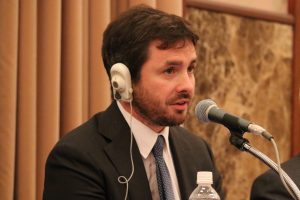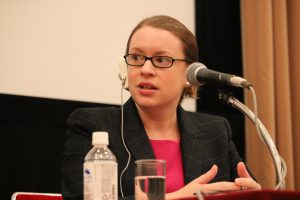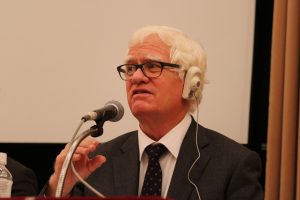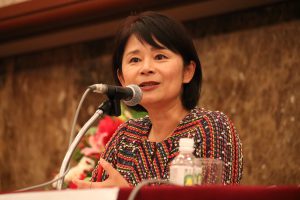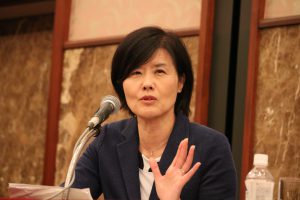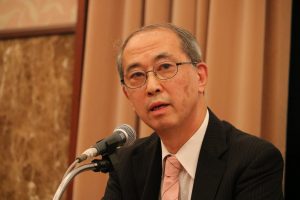Date : October 3, 2017
Video Report:FPCJ Symposium ”How can the Risk of a Global Economic Recession Be Avoided Amidst the Rise of Nationalism?”
post date : 2017.10.16
FPCJ Symposium
”How Can the Risk of a Global Economic Recession
Be Avoided amidst the Rise of Nationalism?”
On October 3, 2017, on the 10th floor of the Nippon Press Center Building, Foreign Press Center Japan held a symposium based around the theme of “How can the risk of a global economic recession be avoided amidst the rise of nationalism?” (supported by the Ministry of Foreign Affairs). Leading journalists from Canada, the UK, and the US joined the symposium as panelists. Japanese journalists and experts were also invited to provide the keynote speech, act as a moderator, and as panelists. During the symposium, they discussed the impact of the rise of nationalism in the West on the post-World War II trend towards free trade, and how to avoid a global economic recession. The symposium was attended by 160 people, including students, company workers, members of the Japanese and foreign media, and foreign embassy staff. Below is a summary of the keynote speech and panel discussions.
*****
■ Keynote Speech by Mr. Hiroki Sugita (Chief Editorial Writer, Kyodo News)
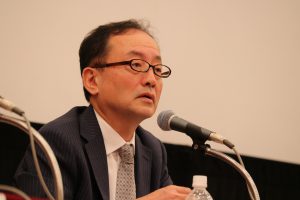 Mr. Sugita stated that in various countries, politics was now driven by anger instead of hope, and there was significant distrust of elites and the establishment. He then noted that the differences of the current nationalism seen with the election of US President Trump and the Brexit vote, as compared to populism in the past, were: 1) The expansion of popular elections, 2) A shift in the structure of the economy with the decline of the manufacturing industry, and 3) The democratization of media with the adoption of social media.
Mr. Sugita stated that in various countries, politics was now driven by anger instead of hope, and there was significant distrust of elites and the establishment. He then noted that the differences of the current nationalism seen with the election of US President Trump and the Brexit vote, as compared to populism in the past, were: 1) The expansion of popular elections, 2) A shift in the structure of the economy with the decline of the manufacturing industry, and 3) The democratization of media with the adoption of social media.
He argued that international society would simultaneously progress along three lines, all of which Japan should take part in:1) US-centric globalization, 2) China-centric globalization, and 3) Globalization through mutual understanding brought about by the movement and interaction of people. He concluded by arguing that the policy-makers of countries seeking to move forward with globalization should provide easy-to-understand explanations of the merits of a free market to people who are against the concept.
■ First Session: The Influence of Nationalism on the Global Economy
Ms. Becky Bowers (The Wall Street Journal, US) mentioned some opinions of US citizens regarding the gap between the promises Trump made during the election campaign and his progress so far. She explained how much of Trump’s support came from people who had lost jobs due to China’s economic rise, and who were worried about losing jobs to further automation as well.
Mr. Tom Nuttall (The Economist, UK) described how the gulf is widening between Leave voters (concerned about increasing immigration) and Remain voters (concerned about future economic activities). He also noted that with the threat of terrorism in countries throughout the EU, it has become easier for protectionist and nationalist movements to gather support.
Dr. Thomas Walkom (Toronto Star, Canada) stated that Canadians were mainly concerned with the renegotiation of NAFTA, which has formed the basis for Canada’s economy for the past two decades. However, he also explained that economic nationalism did not always have a negative impact on citizens of that country, and that people were growing tired of hearing about xenophobia and racism.
Dr. Shujiro Urata (Professor, Waseda University) argued that the biggest impact on Japan from Trump’s election victory was the US withdrawing from the TPP. He later noted his opinion that the Japanese government was showing strong leadership in working towards a TPP-11 agreement without the US, and stated there was a possibility for the US to return to the TPP framework in the future.
Dr. Yoshiko Kojo (Professor, The University of Tokyo) noted that no previous US president has made comments such as Trump’s about multilateralism not benefitting the US. She stated that Trump’s protectionism has raised concerns, considering that it has been said the US’s protectionist policies before World War II spread to other nations and became one cause of political conflict. However, she argued that his protectionism has been inconsistent and only applied towards trade so far, while financial regulations have instead been loosened.
After each panelist made their statements, there was a lively debate about topics including employment adjustment and retraining people who lost their jobs.
■ Second Session: How to Avoid the Risk of a Global Economic Recession
Following the debate of the first session, the panelists then discussed what actions could be taken by individual countries and through international frameworks in order to avoid the risk of global economic recession.
Dr. Walkom argued that there was a limit to the economic role of multilateral frameworks such as the G7 which do not include emerging economies or international institutions like the IMF.
Ms. Bowers explained how although infrastructure spending, the manufacturing industry, SMEs, and consumer confidence were recovering in the US economy, there was a major gap in consumer confidence measurements between optimistic Republicans and pessimistic Democrats.
Mr. Nuttall argued that Trump’s protectionism helped move forward the EPA between Japan and the EU, which may end up larger than the TPP without the US. He stated that it would be necessary to think about which country should demonstrate leadership in the global economy in the future.
Dr. Urata proposed that assembling multilateral economic frameworks would help avoid the risk of a global recession. He suggested that it was necessary to reach an agreement on the TPP-11 quickly, while also keeping in mind a TPP-16 including countries such as South Korea and Thailand in the future. He also indicated his hopes that in addition to swiftly reaching an agreement on the EPA with the EU, Japan would take a leading role in the RCEP negotiations in particular, and demonstrate leadership in creating a strong free trade system.
Dr. Kojo stated that although international frameworks such as the WTO and IMF faced a period of strong criticism, due to a backlash against globalization, with Trump as US president the G7 might now be of greater importance to try to convince Trump to correct the course of the US as it moves towards protectionism. After the statements by each panelist, the discussion included topics such as the necessity of explaining simply to citizens the merits of free trade, the necessity of correcting inequality and restoring people’s sense of self-worth, and immigration issues.
The panelists were asked a variety of questions during the Q&A session, covering topics such as the retraining of people who have lost their jobs in the US, the impact of the North Korea issue on the global economy, Japan’s role in negotiating multilateral frameworks, and the relation between Trump’s policies and the WTO.
The moderator, Ms. Miki Ebara (Editor-in-Chief, NHK World), concluded by stating that as the world goes through rapid changes with an increasing population and emerging nations gaining influence, the recent trend of nationalism has created the opportunity to once again think about free trade and liberalism, which had been taken for granted until now. She ended by saying that the time has come to think about ways to improve lives around the world and about how the global economy works.
------------------ Speakers profiles ------------------
■ Keynote speaker/ Panelist
Hiroki Sugita, Chief Editorial Writer, Kyodo News
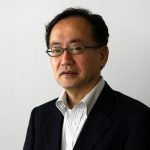 He served as Tehran Bureau Chief, New York Correspondent, Washington Bureau Chief, and Managing Senior Writer at Kyodo. He writes about international affairs, and frequently interviews global leaders including Vladimir V. Putin and George W. Bush. His current career includes Planning Committee Member, Japan National Press Club; Selection Committee Member of Abe Fellowship Program; and Lecturer at Waseda University. He is the author of many books including “Kensho Hikaku no Sentaku” (Japan’s non-nuclear weapon policy); “Amerika wa Naze Kawarerunoka” (Why can the United States change? ); and “Nyumon Trump Seiken” (A Guide to the Trump Administration).
He served as Tehran Bureau Chief, New York Correspondent, Washington Bureau Chief, and Managing Senior Writer at Kyodo. He writes about international affairs, and frequently interviews global leaders including Vladimir V. Putin and George W. Bush. His current career includes Planning Committee Member, Japan National Press Club; Selection Committee Member of Abe Fellowship Program; and Lecturer at Waseda University. He is the author of many books including “Kensho Hikaku no Sentaku” (Japan’s non-nuclear weapon policy); “Amerika wa Naze Kawarerunoka” (Why can the United States change? ); and “Nyumon Trump Seiken” (A Guide to the Trump Administration).
■ Moderator
Ms. Miki Ebara, Editor-in-Chief, NHK World
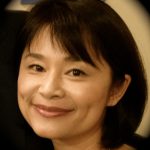 Miki Ebara currently is the Editor-in-Chief of NHK WORLD’s 24-hour English news program, Newsline. Over the last three decades, she’s built her journalistic carrier as a foreign correspondent based in London, Bangkok and New York, covering global conflicts and disasters such as wars in Bosnia, Afghanistan and Iraq; the Indian Ocean tsunami, the earthquake in Haiti; 9-11 in New York; and the aftermath of the major disaster of Japan’s 2011 earthquake. She also reported extensively on the United Nations from New York and the US presidential elections. She’s hosted news shows as an anchor and appears as a commentator on NHK WORLD.
Miki Ebara currently is the Editor-in-Chief of NHK WORLD’s 24-hour English news program, Newsline. Over the last three decades, she’s built her journalistic carrier as a foreign correspondent based in London, Bangkok and New York, covering global conflicts and disasters such as wars in Bosnia, Afghanistan and Iraq; the Indian Ocean tsunami, the earthquake in Haiti; 9-11 in New York; and the aftermath of the major disaster of Japan’s 2011 earthquake. She also reported extensively on the United Nations from New York and the US presidential elections. She’s hosted news shows as an anchor and appears as a commentator on NHK WORLD.
■ Panelists
Dr. Shujiro Urata, Professor and Dean of the Graduate School of Asia-Pacific Studies, Waseda University
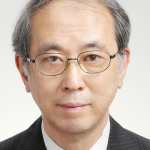 Shujiro Urata is Dean and Professor of Economics at the Graduate School of Asia-Pacific Studies, Waseda University. He is also a Specially Appointed Fellow at the Japanese Centre for Economic Research (JCER), Faculty Fellow at the Research Institute of Economy, Trade & Industry (RIETI), and Senior Research Adviser for the Executive Director of the Economic Research Institute for ASEAN and East Asia (ERIA) in Jakarta. Professor Urata received his B.A. in Economics from Keio University and his M.A. and Ph.D. in Economics at Stanford University. He is a former Research Associate at the Brookings Institution and Economist at the World Bank. He specializes in International Economics and Economics of Development. He has held a number of research and advisory positions including senior advisor to the Government of Indonesia and consultant to the World Bank, OECD, the Asian Development Bank and the Government of Japan. He published and edited a number of books on international economic issues and is an author and co-author of numerous articles in professional journals. His books published in English include Multinationals and Economic Growth in East Asia (co-editor, Routledge, 2006), Free Trade Agreements in the Asia-Pacific (co-editor, World Scientific, 2010), Economic Consequences of Globalization: Evidence from East Asia (co-editor, Routledge,2012).
Shujiro Urata is Dean and Professor of Economics at the Graduate School of Asia-Pacific Studies, Waseda University. He is also a Specially Appointed Fellow at the Japanese Centre for Economic Research (JCER), Faculty Fellow at the Research Institute of Economy, Trade & Industry (RIETI), and Senior Research Adviser for the Executive Director of the Economic Research Institute for ASEAN and East Asia (ERIA) in Jakarta. Professor Urata received his B.A. in Economics from Keio University and his M.A. and Ph.D. in Economics at Stanford University. He is a former Research Associate at the Brookings Institution and Economist at the World Bank. He specializes in International Economics and Economics of Development. He has held a number of research and advisory positions including senior advisor to the Government of Indonesia and consultant to the World Bank, OECD, the Asian Development Bank and the Government of Japan. He published and edited a number of books on international economic issues and is an author and co-author of numerous articles in professional journals. His books published in English include Multinationals and Economic Growth in East Asia (co-editor, Routledge, 2006), Free Trade Agreements in the Asia-Pacific (co-editor, World Scientific, 2010), Economic Consequences of Globalization: Evidence from East Asia (co-editor, Routledge,2012).
Dr. Yoshiko Kojo, Professor, Graduate School of Arts and Sciences, The University of Tokyo
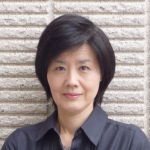 Yoshiko Kojo is Professor of International Relations, Department of Advanced Social and International Relations, University of Tokyo (International Relations, International Political Economy). She obtained her Ph.D. (Politics) from Princeton University, M.A. from Princeton University and University of Tokyo, and B.A. from the University of Tokyo. She was a visiting scholar at Princeton University and Johns Hopkins University. Prof. Kojo’s main research interests are the effect of international economic interdependence on state policy, distributive effects of global economy on domestic politics, and institutionalization in global economy.
Yoshiko Kojo is Professor of International Relations, Department of Advanced Social and International Relations, University of Tokyo (International Relations, International Political Economy). She obtained her Ph.D. (Politics) from Princeton University, M.A. from Princeton University and University of Tokyo, and B.A. from the University of Tokyo. She was a visiting scholar at Princeton University and Johns Hopkins University. Prof. Kojo’s main research interests are the effect of international economic interdependence on state policy, distributive effects of global economy on domestic politics, and institutionalization in global economy.
Ms. Becky Bowers, Deputy Global Economics Editor, The Wall Street Journal (U.S.)
 Becky Bowers, deputy global economics editor for The Wall Street Journal in Washington, D.C., joined the newsroom as editor of Real Time Economics in September 2014. She had worked for the Tampa Bay Times in Florida since 2002 as a staff writer, wire editor, business graphics reporter and deputy editor in business and in politics. She also wrote and managed digital operations for its fact-checking site, PolitiFact. She studied journalism at her hometown California State University, Chico.
Becky Bowers, deputy global economics editor for The Wall Street Journal in Washington, D.C., joined the newsroom as editor of Real Time Economics in September 2014. She had worked for the Tampa Bay Times in Florida since 2002 as a staff writer, wire editor, business graphics reporter and deputy editor in business and in politics. She also wrote and managed digital operations for its fact-checking site, PolitiFact. She studied journalism at her hometown California State University, Chico.
Mr. Tom Nuttall, Charlemagne Columnist, The Economist (U.K.)
 Tom Nuttall writes the Charlemagne column in the Economist, covering European politics and economics. He is the author of "Looking for a home," a special report on refugees, and is a regular broadcaster on television and radio. He is based in Brussels.
Tom Nuttall writes the Charlemagne column in the Economist, covering European politics and economics. He is the author of "Looking for a home," a special report on refugees, and is a regular broadcaster on television and radio. He is based in Brussels.
Mr. Thomas Walkom, National Affairs Columnist, The Toronto Star (Canada)
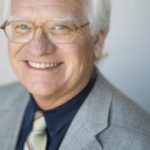 Thomas Walkom has been a columnist for the Toronto Star since 1989. He writes on political economy. From 1985 to 1988, he was Tokyo Bureau Chief for the Globe and Mail. He is the winner of two National Newspaper Awards and holds a PhD in economics from the University of Toronto.
Thomas Walkom has been a columnist for the Toronto Star since 1989. He writes on political economy. From 1985 to 1988, he was Tokyo Bureau Chief for the Globe and Mail. He is the winner of two National Newspaper Awards and holds a PhD in economics from the University of Toronto.




